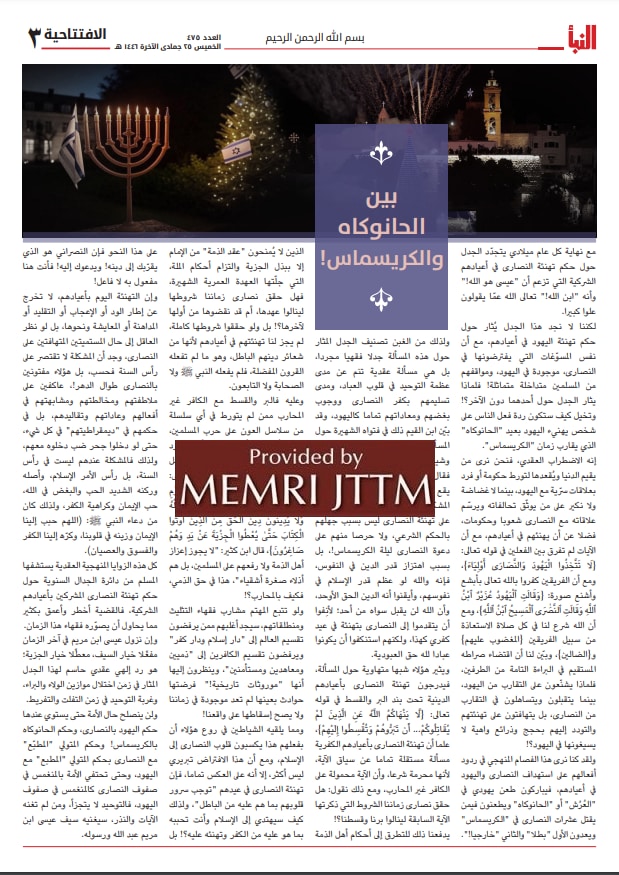The following report is now a complimentary offering from MEMRI's Jihad and Terrorism Threat Monitor (JTTM). For JTTM subscription information, click here.
On December 26, 2024, the Islamic State (ISIS) released issue 475 of its weekly newsletter, Al-Naba'. The issue's feature article, titled: "Amongst Hanukkah and Christmas," discusses the alleged annual recurring debate among Muslims on the permissibility of congratulating Christians on their religious holidays, "which celebrate beliefs contradicting Islamic monotheism."
The article examines why similar debates do not arise regarding Jewish holidays, despite "shared theological concerns," criticizing the inconsistency in treating Jews and Christians differently, and suggesting that this reflects a lack of conviction in Islamic principles.
The text highlights the theological implications of such actions, viewing them as signs of weakened faith and attachment to Islam, arguing that true adherence to Islam requires equal treatment of all non-Muslim groups in accordance with Islamic beliefs.

Highlighting The "Inconsistency" In Interactions With Christians Versus Jews
Al-Naba's editorial opened: "At the end of every Gregorian year, the debate is renewed about the ruling on congratulating Christians on their official holidays, who claim that Jesus is Allah or that 'He is the Son of Allah.'"
Criticizing the "inconsistency" in attitudes toward congratulating Christians versus Jews on their religious holidays, the editorial examines why disputes regarding acknowledging Christmas are more common, in contrast to Jewish holidays. The piece asked: "We do not see the same debate arise about congratulating Jews on their holidays, despite the same justifications they use for Christians applying to Jews as well. The positions of both groups toward Muslims are intertwined and similar. Why, then, is the debate raised about one, and not the other?"
It further highlights the perceived double standard in interactions with Christians versus Jews, calling it a "theological inconsistency" that reflects selective leniency and bias:
"We have witnessed this methodological contradiction in their reactions to targeting Christians and Jews during their holidays. They celebrate an attack on a Jew during Purim or Hanukkah, yet criticize anyone who kills dozens of Christians during Christmas. They label the former a 'hero' and the latter an 'extremist.'"
"The Debate Reflects The Strength Of Monotheism"
The weekly further argues that the debate over congratulating Christians on their religious holidays is not just a jurisprudential matter but rather a spiritual issue, which reflects the strength of monotheism and commitment to Islamic principles.
It asserts: "Ibn al-Qayyim clarified this in his well-known fatwa on the issue, addressing the core of the problem with his usual deep understanding of human nature. He said: 'Many who have little regard for religion fall into this.' This, by Allah, remains the crux of the issue and the root of the problem."
Condemning the tendency to justify such congratulations by misinterpreting Quranic verses, the article suggests that people's eagerness to congratulate Christians is not due to ignorance of the Islamic ruling, or out of a sincere desire to invite Christians to Islam: "Instead, it stems from a diminished regard for the value of religion in their hearts."
"Congratulating Christians Is Impermissible"
The weekly publication deems that acknowledging Christian holidays, such as Christmas, to be haram [impermissible]. Unrelated to Quranic guidance on treating peaceful non-Muslims with fairness, the editorial states: "Congratulating Christians on their religious holidays of disbelief is prohibited by Islamic law."
Even if they were considered "Ahl Al-Dhimma [People of the Covenant]" under Islamic governance, the article argues, "modern Christians have violated the terms of the "Dhimma," and even fulfilling them would not permit celebrating their holidays as they are part of "false religious rituals."
"Have the Christians of today fulfilled the conditions of paying the jizya (tax for non-Muslims under Islamic rule) and adhering to the rulings of Islam - when living under Muslim ruler - to deserve this contract, or have they completely violated them? Even if they had met all the conditions, it would still not be permissible to congratulate them on their holidays, as these are rituals of their false religion."
"Acknowledging Christmas Reinforces Christians' Bond To Their False Belief"
The editorial views that commending Christians on their holidays strengthens their attachment to their "false" beliefs. Therefore, "how can they be guided to Islam if you are endorsing and congratulating them on their disbelief?"
"Instead, this approach makes Christians draw you closer to their religion and invite you to it," the article warns, "rendering you a passive recipient rather than an active influencer."
It additionally claims that love and hatred for the sake of Allah are foundational in Islam, and celebrating non-Islamic holidays compromises this principle.
"The problem lies not just with celebrating the New Year, but with the core of faith itself. The foundation of Islam is love and hatred for the sake of Allah—loving faith and detesting disbelief."
"The Coming Of Jesus Will Solve The Debate"
The article presents the ultimate resolution to this religious and societal debate: "The descent of Jesus, son of Mary, in the end times will decisively resolve this debate."
The piece continues: "He will abolish the jizya and present people with the choice of Islam or the sword. This divine and theological resolution addresses the confusion of loyalty and disavowal in this era of spiritual imbalance and weakened monotheism."
"Unity In Monotheism Cannot Be Fragmented"
Echoing its assessments, the editorial urges the consistency in attitudes toward Christians and Jews, arguing that true monotheism cannot be fragmented.
"The Muslim community will not improve until it equates its treatment of Jews and Christians, its view of Hanukkah with Christmas, and its stance toward those allied with Christians with its stance toward those allied with Jews."
Stressing that "Unity in monotheism cannot be fragmented," the editorial concludes with a warning: "Those who fail to heed the warnings and signs will ultimately be guided by the sword of Jesus, the servant and messenger of Allah."




